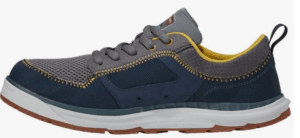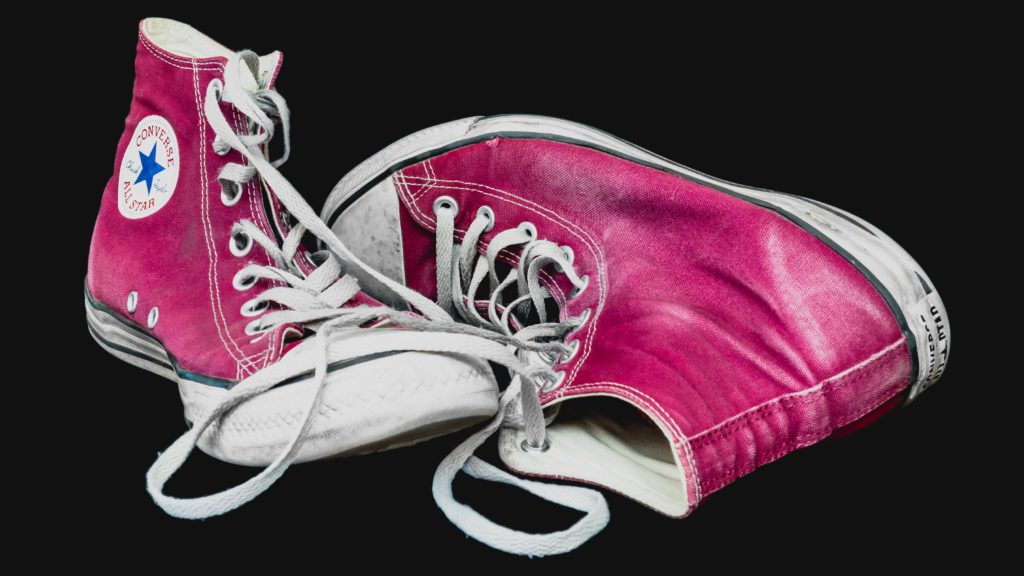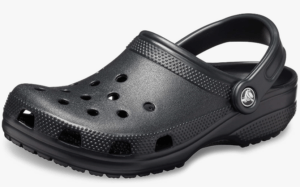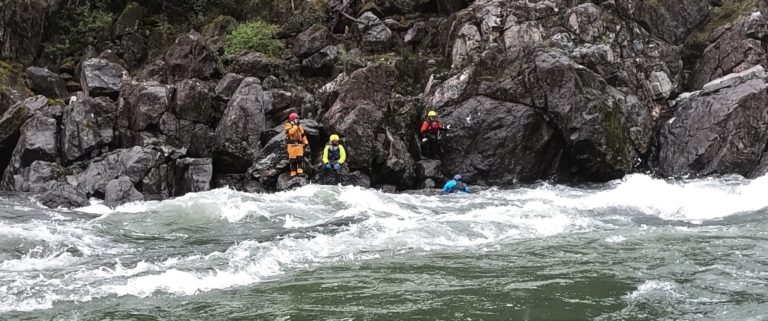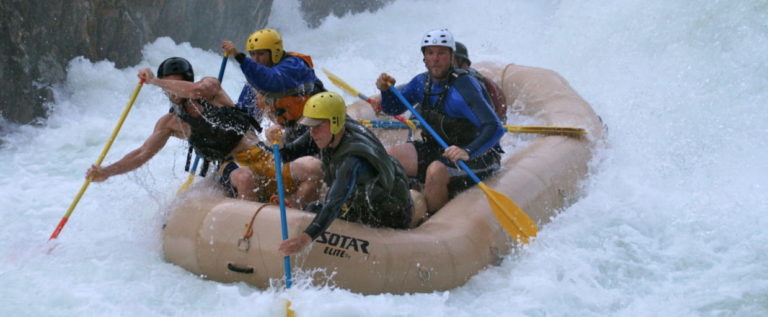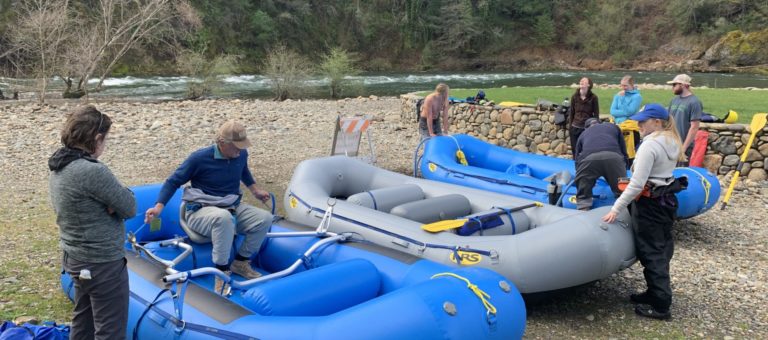Proper footwear can make or break your river rafting experience. Quality rafting shoes and sandals dry quickly, secure well to your foot and provide traction in a variety of conditions. Unfortunately the same footwear is not ideal for everyone and every white water trip. Some trips need footwear that is primarily suited for swimming, others need it to be better for walking on rocks.
This article answers the question of what shoes to wear white water rafting by breaking down the advantages and disadvantages of the most common and best shoes and sandals for rafting. We also discuss which shoes/sandals are better for specific types of white water rafting trips.
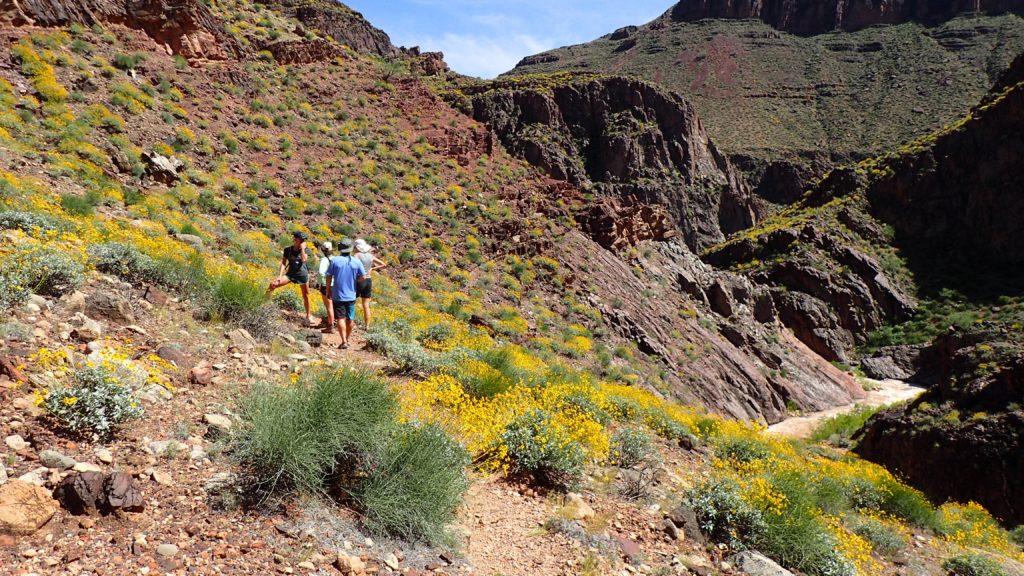
Rafting Shoe Options
Shoe Sole Rubber Softness/Stickiness
This is different than having a thin soled shoe. Softer rubber in general is stickier so soft soled rafting shoes do better on wet rocks but they also wear out faster and don’t hold onto glue. Pretty much any company selling a really sticky shoe will have problems with the soles delaminating but the sticky rubber is worth it. Spider rubber and 5’10 rubber (on some Addidas) are the two best soles for traction and safety.
Closed Toed River Shoes & Sandals
Closed toed shoes and sandals better protect your toes and feet on all aspects of a river trip. When loading and unloading heavy gear, getting in and out of the rafts on wet uneven rocks, securing yourself in a paddle raft by stuffing your foot under a thwart in the raft.
Ankle Coverage
Some river shoes are high topped to protect ankles from rocks when wading in shallow water and support ankles. High tops also help keep debris out of the shoes. However, they allow less range of motion making swimming more challenging. They also tend to be heavier shoes.
Collecting Sand and Rocks
Certain shoes/sandals like Keens that have a fair amount of openings collect significant amounts of sand and rocks. These types of shoes are difficult to get sand and rocks out without taking them off. Shoes also have this problem which is why I prefer wearing synthetic or thin neoprene socks to prevent those annoying little pieces of debris from wearing holes in my skin. Sandals like Chacos, Bedrocks or Tevas are easier to rinse rocks and sand out of while keeping them on.
Secure Attachment Strap or Laces
Certain shoes fall off too easily particularly water socks and flip-flops. Both seem to get sucked off as soon as a person falls in the river. They also want to be clean with minimal loose pieces that can get caught on gear. Chaco’s with the toe loop and the best sandal in this area. River shoes with laces that can be synched down or sandals with good heal straps like Chacos or Bedrocks are the best option if you happen to take a swim on your rafting trip.
Light Weight/Quick Drying
River footwear works best if it is still light weight when wet. Lighter weight shoes are much easier to walk in when wet and swim in. In addition breathable, quick drying material is ideal to keep the weight down and keep your feet from being soaked all day helping prevent blisters.
Footbeds
Look for good support and traction with no slipping when wet. Leather footbeds are terribly slippery when wet.
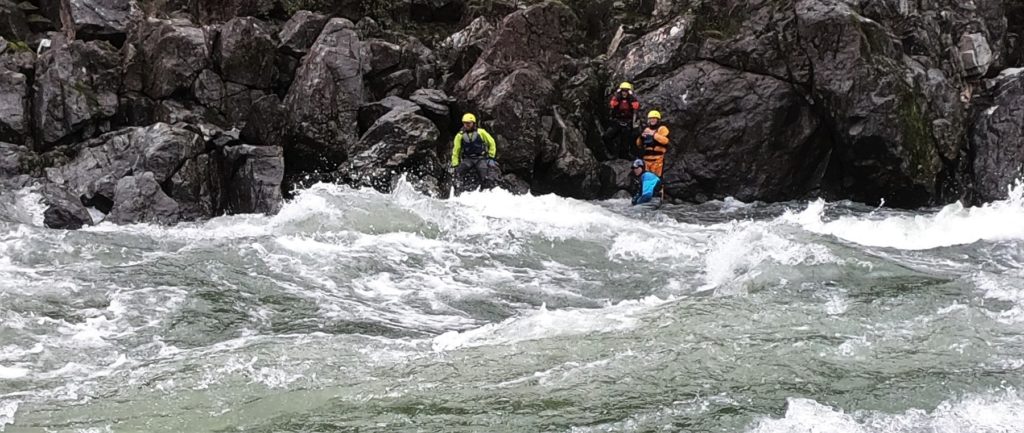
Women’s and Men’s River Rafting Shoes and Sandals
Ability to Walk/hike in them
While river shoes and sandals are for rafting the also need to work well when walking. Many rafting trips will stop and do side hikes up creek beds where feet will be wet. Supportive footwear is key to enjoying these adventures.
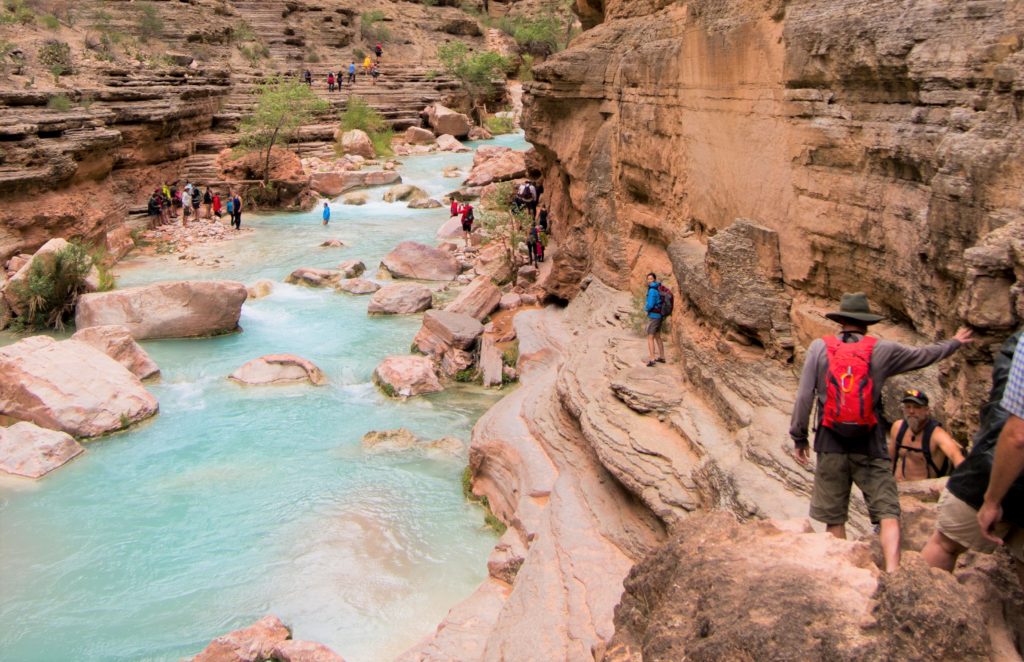
Our Favorite White Water Footwear Companies
While our list is not exhaustive these are the major players in whitewater footwear. We’ll start with sandals since that is what most people prefer using on the river. However, I would not recommend sandals if your are rafting class IV of class V, you are better off with an old pair of running shoes that protect your feet well.
Keens Sandals
Keens are well made, can be put to good use after your river trip and will probably last a while. The biggest downsides are the way they collect sand in the footbeds – which can be mitigated somewhat by wearing socks and the soles are hard so they provide unbelievably poor traction of wet rocks. However, they provide excellent toe protection and many guests on trips enjoy hiking in them even on dry trails. I’ve also found larger less stable people prefer the Keens to other sandals for stability and foot protection. Swimmers sometimes loose a Keen, typically because they didn’t tighten it enough or the heal has loosed up over time..
Chaco River Sandals
Chaco made the best river sandal. They hold to your foot well and are almost like flipper if you have to swim in them. By far the best footwear to have if you are swimming in a river. The downside is the lack of toe protection which makes it hard to stuff your foot under a thwart to keep yourself in a paddle raft. They’ve also had some problems with delamination of their soles over the years but any shoe or sandal with softer rubber has that problem. Unfortunately Chaco seems to have stopped making sandals with the sticky rubber because of this. A pro-tip, if you find your starting to get wear points on your skin from the strap while rafting, stop using the toe strap on Chacos and wear socks to give your feet a day or two to heal. Never seen a swimmer loose a Chaco!
Bedrocks Sandals for Rafting
If you have a cool friend, like my friend Jed, they are probably wearing Bedrocks. Bedrocks aren’t just cool, they are also functional. While they don’t protect much of your foot, everyone I know that has them still loves them. These lightweight sandals are where Chacos were 10 years ago and Tevas were 20 years ago – still being made with quality for people in the outdoor industry. Get them now before some big company buys them and then starts cutting corners to make more money turning the Bedrocks into another Chaco or Teva.
Addidas/Five-Ten Rafting Shoes
Addidas recently purchased Five-Ten, a climbing shoe company. Five-Ten made the stickiest river shoes on the market. Addidas has started using the Five-Ten sticky rubber on some of their shoes. Here are their newer water shoes. My biggest concern is that Addidas will stop making a quality water shoe because it is such a niche market and the sole delamination issues become to much of a headache for the manufacturer. Get yours while you still can!
Astrals
For a while Astral were the best river shoes on the market because they were light weight, fast drying and had super sticky rubber. They always had problems with falling apart but were worth buying. The Addidas aren’t quite as light weight or quick drying but their rubber is as sticky and they seem to hold up better over time. The Astral Brewer is probably the best selling rafting shoe that is still in production and still an excellent option.
Video: Astral Brewer Rafting Shoes
Old Running/Tennis Shoes
One of the best options for big days of white water rafting. They protect your feet well, have a think enough sole to protect the bottom of your foot from rock but the soles are still fairly soft making them better on rocks. you can hike in them if necessary, and they are in the back of your closest. Throw them away at the end of the trip if they are old enough.
White Water Rafting Shoes to Avoid
Watch out for “water shoes” they fall off easily and the soles are too thin. These are the ones that have no straps or laces to cinch down. In fact, any footwear without laces or straps to cinch down is probably a bad idea.
Wetsuit booties most often provide no arch support and have thin soles. However, thick soled booties are toasty warm and do a good job of protecting drysuit booties.
Flip flops need to be reserved for camp and are useless when running whitewater. Also, flip flops are a terrible choice for put-in and take-out.
River Shoes versus Trip Type
The optimal shoe or sandal for a river trip is influenced by the type of trip and location of the trip. One and two day trips have different concerns than week long trips. The environment also impacts you choice of footwear.
Shorter Trips: Shorter 1 and 2-day trips typically have many more rapids per mile. This means feet tend to stay wet the entire day and trips are more likely to use paddle rafts. For these types of trips shoes work best.
Paddle raft trip: When paddling in a raft it is nice to have closed toed shoes to stuff under a thwart. On the flip side oar trips lend themselves to being nicer in sandals
Cool Weather Trips: Shorter trips are also more likely to be early in the season when the weather and water is cooler. Wear shoes with wool socks or neoprene socks keeps feet and therefore bodies warmer.
Desert Rivers: Foot rot and fungus can be a problem. Sandals allow feet to stay drier providing worse habitat for those nasty little creatures.
Rafting Shoes for Drysuits
Assuming you are wearing a drysuit with goretex socks, it’s nice to wear a thin pair of neoprene socks over the goretex socks to protect them. In terms of shoes the Adidas seem to currently be the best option for traction and durability. I go up a half shoe size to be able to fit the layered neoprene socks, goretex socks and synthetic socks inside the shoe.
If you have major problems with cold feet and are less worried about traction you can always go old school thick soled neoprene booties.
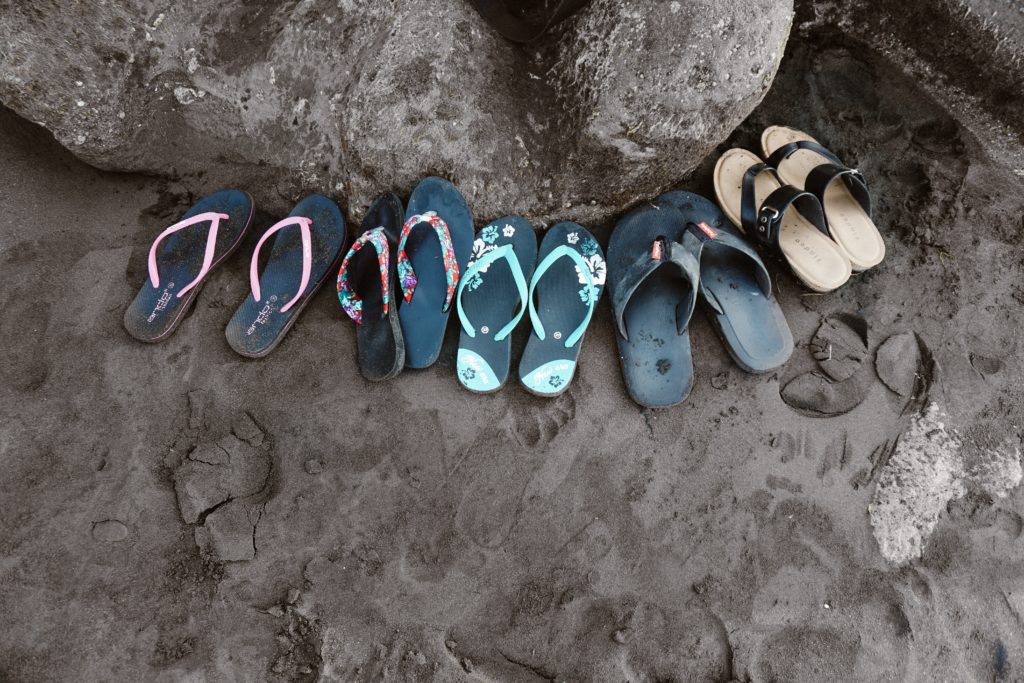
Rafting Camp Shoes
Nice camp shoes allow feet to air out if they have been wet rafting all day. Once they have dried out I’m a fan of clean cotton socks in a clean shoe. I find this is the best environment to keep my feet happy. On that same note, sleeping in a separate pair of cotton socks does wonders for preventing and helping heal foot ailments.
Crocs
These are nice since you can air your feet out in them and then throw on some socks. Crocs are light weight, dry quickly and easy to clean. Just don’t plan to use them for hiking or rafting, they don’t have the support or ability to cinch well to your feet.
Flip-flops
Not good for rapids, put-in or take-out. Nice in camp for giving your feet some air out time or for that late night run to the groover (toilet). Plus they pack small!
Old Tennis/Running Shoe
Again an old pair of shoes works great for camp. Just don’t plan to use the same pair for camp and the river. You’ll want those dry shoes when you hit camp for the night. They also work well for short hike and exploring.
Concluding Thoughts on Rafting Shoes and Sandals
Break-in your new sandals/river shoes by wearing them for a few weeks before your trip to get your feet accustomed to them. Make sure footwear fits securely. If you can easily pull them off without loosening the strap or laces they have a high probability of falling off if you swim a rapid.
Having the right footwear makes rafting trips much more enjoyable. Select a quick drying shoe or sandal that will stay on and provides traction while rafting, swimming white water and walking on the rocks. On multi-day trips be sure to have another set of footwear for when you hit camp to give your feet a break from their daytime environment. Take care of small problems before they become big ones. Wear socks and/or throw on duct tape to protect spots that are starting to get sore before they get bad and negatively impact your trip. Consider wearing neoprene socks instead of synthetic socks since they keep feet warmer. Finally, even if you do everything right your feet will probably get a little bet up on the trip, consider it part of the adventure.
Wanting more gear ideas check out our articles about what to wear rafting and recommended rafting safety gear.








